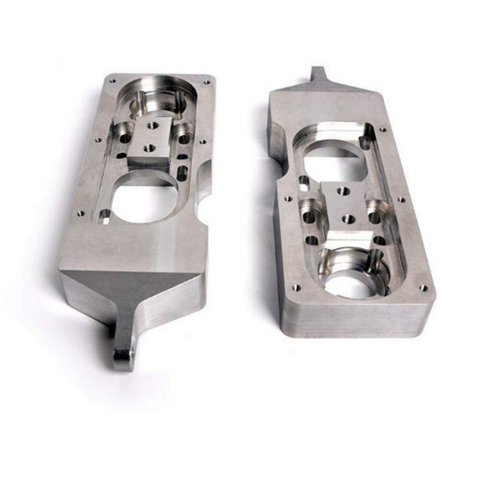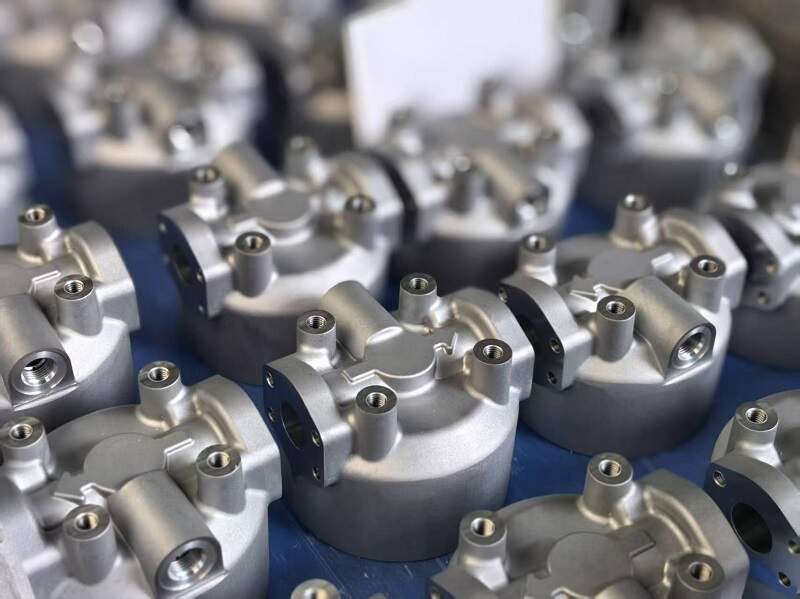Checking out the Duty of Factory Services ahead of time Modern Engineering Solutions
Factory solutions are vital fit modern engineering solutions - aluminum casting. They connect the void in between traditional production strategies and the needs of modern sectors. With advancements in automation and sustainability, foundries are progressing to fulfill the demands of industries such as aerospace and auto. This makeover elevates inquiries concerning the effects for materials, processes, and future developments. What difficulties and opportunities lie ahead for foundry solutions in this swiftly changing landscape?
The Evolution of Foundry Providers in Engineering

The assimilation of computer-aided style (CAD) and simulation software has actually changed the design and manufacturing procedures, enabling factories to produce intricate geometries with higher accuracy. The change in the direction of eco-friendly methods has led to the adoption of greener innovations and reusing efforts within foundries. As industries progressively prioritize personalization and rapid prototyping, foundry services have expanded their capabilities, ensuring they stay essential factors to the engineering landscape. This evolution highlights the factory's vital function in supporting advancements throughout different industries, including automotive, aerospace, and energy.
Key Procedures and Strategies in Modern Foundries
Modern shops utilize a variety of key processes and techniques that enhance the performance and top quality of metal casting. Among these, sand casting stays common due to its flexibility and cost-effectiveness. The use of advanced innovations, such as computer-aided style (CAD) and computer-aided manufacturing (WEBCAM), permits for exact modeling and manufacturing, making sure high accuracy in component measurements. Furthermore, investment spreading is favored for generating complex geometries with outstanding surface area coatings.
Automation and robotics boost production speed and uniformity while decreasing labor costs. Methods like additive manufacturing are increasingly incorporated to produce detailed molds and cores, thereby minimizing product waste. The application of thermal analysis aids in optimizing spreading procedures by predicting and regulating solidification behavior. Collectively, these procedures and methods exhibit how modern-day foundries are adapting to satisfy the needs of modern design difficulties, making certain remarkable product quality and operational efficiency.
The Relevance of Products Selection in Shop Services
Selecting the proper materials is crucial in shop services, as it directly influences the mechanical residential properties, resilience, and general efficiency of the last item. Different materials possess special features, such as tensile toughness, corrosion resistance, and thermal stability, which should line up with the designated application of the actors parts. Metals like light weight aluminum and steel are usually picked for their strength-to-weight proportion, while alloys can enhance details performance traits.
The choice process entails taking into consideration aspects such as accessibility, manufacturability, and cost, which can especially influence task timelines and spending plans. Furthermore, developments in product scientific research allow the development of cutting-edge composites and specialized alloys that deal with emerging design difficulties. A complete understanding of material homes and their effects is important for engineers and foundry professionals to achieve successful outcomes in their jobs. This careful selection process ultimately improves the dependability and effectiveness of completion items.
Foundry Providers in Aerospace and Automotive Applications
Foundry solutions play a crucial role in the aerospace and automotive industries, where accuracy and performance are paramount. These fields depend heavily on the manufacturing of complex elements that have to fulfill rigorous quality criteria and endure extreme conditions. Factories give vital solutions such as spreading, machining, and completing, making certain components are lightweight yet durable, essential for improving fuel effectiveness and safety and security.
In aerospace, shop services add to the production of generator blades, engine parts, and structural parts, all of which demand elaborate layouts and high-performance products. In a similar way, in the auto sector, shops provide engine blocks, framework parts, and transmission situations, concentrating on toughness and weight decrease.
Advanced factory methods, including additive manufacturing and precision casting, are progressively used to meet the particular requirements of these sectors. By supplying customized solutions, shop services aid drive innovation and keep competitive benefits in the fast-evolving aerospace and automotive landscapes.
Technologies Driven by Shop Capabilities
Numerous innovations in have a peek at this site engineering are fueled by the advanced capacities of factory services. These services make it possible for the manufacturing of intricate geometries and high-performance products that are necessary for contemporary applications. As an example, additive manufacturing, commonly referred to as 3D printing, has seen substantial innovations with foundry strategies, permitting the quick prototyping of complex designs. Additionally, the capacity to cast light-weight alloys has revolutionized markets such as aerospace and auto, resulting in improved gas efficiency and efficiency.
Furthermore, factories are significantly integrating clever technologies, such as automation and data analytics, to enhance manufacturing performance and quality control. These technologies not only minimize waste however likewise enable personalization at range, meeting the details demands of customers. By leveraging innovative foundry abilities, engineers can discover brand-new frontiers in product layout and functionality, ultimately driving development across different fields and establishing a foundation for future developments.
Future Patterns in Factory Solutions and Design Solutions
The future of shop services is formed by arising trends such as lasting production methods, which prioritize ecological responsibility. Automation and clever modern technologies are set to enhance performance and precision, while enhancing customization and adaptability will certainly meet the advancing demands of clients. As these trends progress, they will certainly redefine the landscape of design remedies in the shop sector.
Lasting Production Practices
As markets increasingly focus on environmental duty, lasting manufacturing methods within foundry solutions are becoming vital to modern-day design services. These practices concentrate on lessening waste, reducing power consumption, and using environment-friendly materials throughout the manufacturing procedure. By executing techniques such as recycling scrap steel and optimizing melting procedures, factories can notably lower their carbon impact. Furthermore, the fostering of life process assessments permits suppliers to assess the ecological effect of their products from beginning to disposal. Working together with suppliers dedicated to sustainability further improves the effectiveness of these campaigns. Ultimately, welcoming lasting production not just aligns with global environmental goals yet likewise promotes innovation and competitiveness in the swiftly progressing design landscape.
Automation and Smart Technologies
While several sectors are embracing technological improvements, foundry services are experiencing a substantial makeover via automation and smart technologies. The assimilation of robotics and automated systems boosts manufacturing performance, lowers human mistake, and increases the manufacturing process. Smart innovations, such as IoT and AI, make it possible for real-time monitoring and anticipating maintenance, which enhance operational performance and reduce downtime. These improvements promote data-driven decision-making, allowing shops to respond promptly to market needs and enhance product high quality. Additionally, automation decreases labor expenses and boosts workplace safety and security by dealing with harmful jobs. As factory solutions remain to take on these innovations, they are positioned to redefine engineering options, resulting in enhanced competition and sustainability in the production industry.
Personalization and Adaptability Fads
Arising fads in foundry services significantly highlight personalization and flexibility to satisfy unique client requirements. This shift mirrors a broader need for tailored design options that adapt to certain job needs and sector standards. Companies are buying innovative modern technologies, such as additive production and electronic modeling, enabling them to generate personalized elements efficiently and cost-effectively. Therefore, foundries are moving read this article far from one-size-fits-all methods, supplying clients the capability to customize designs and materials in real-time. Furthermore, cooperation in between design groups and factory services is ending up being extra incorporated, promoting advancement and accelerating time-to-market. This trend not just boosts item performance but likewise sustains sustainability by decreasing waste via precise manufacturing procedures.
Often Asked Concerns
What Are the Normal Prices Linked With Foundry Providers?
Common costs linked with foundry services consist of material expenses, labor costs, devices usage charges, and overhead prices - Aluminum Foundry. These expenses can differ widely based upon project complexity, volume, and particular needs of the website link engineering service entailed
How much time Does the Foundry Refine Normally Take?
The foundry process usually takes anywhere from numerous weeks to a few months, depending upon factors such as intricacy, material requirements, and manufacturing quantity, which can considerably affect timelines and total task shipment.
What Industries Advantage The Majority Of From Foundry Services?
Industries such as vehicle, aerospace, and building benefit substantially from foundry services. These fields rely upon precision casting and steel construction to produce complicated parts, boosting product efficiency and functional performance in their particular applications.
What Accreditations Should Shops Have?
Foundries must possess accreditations such as ISO 9001 for quality management, ISO 14001 for environmental monitoring, and particular sector qualifications like AS9100 for aerospace or IATF 16949 for automobile, making sure compliance and quality control.
How Do Foundries Guarantee Quality Assurance in Their Procedures?

Factory solutions are necessary in forming modern engineering remedies. As design self-controls have progressed, the duty of foundry solutions has actually changed significantly to meet evolving industry demands. As sectors increasingly focus on modification and quick prototyping, factory services have increased their capacities, guaranteeing they continue to be necessary factors to the design landscape. As industries significantly prioritize environmental responsibility, lasting manufacturing methods within shop services are ending up being vital to modern engineering solutions. Furthermore, partnership in between engineering groups and shop services is coming to be more incorporated, cultivating innovation and accelerating time-to-market.